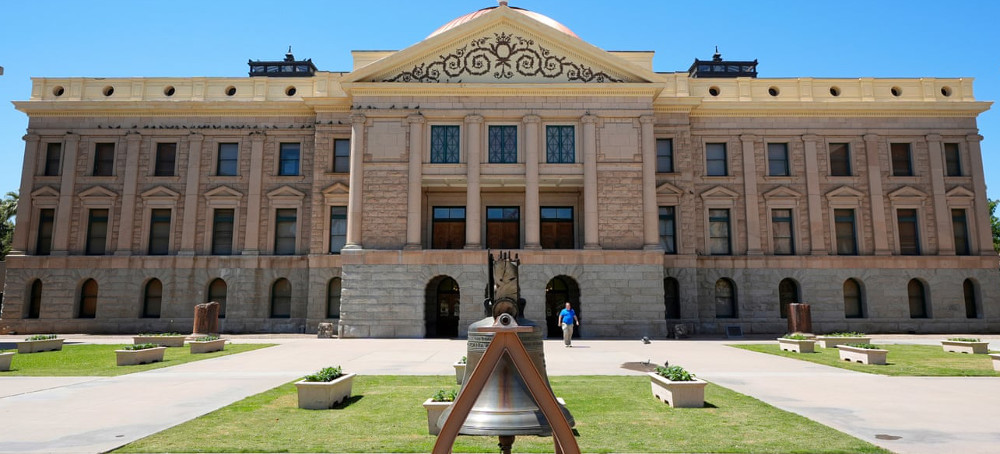Arizona Democrats in New Effort to Repeal 1864 Abortion Ban Law
Guardian UK Democrats at the Arizona capitol in Phoenix are seeking to overturn the 19th-century law for the third straight week following a state supreme court decision. (photo: AP)
Democrats at the Arizona capitol in Phoenix are seeking to overturn the 19th-century law for the third straight week following a state supreme court decision. (photo: AP)
Republicans, who control state legislature, feeling political heat amid focus on imminent threat to reproductive rights
The Arizona supreme court earlier this month concluded the state can enforce a long-dormant law that permits abortions only to save the pregnant patient’s life. The ruling suggested doctors could be prosecuted under the law first approved in 1864, and anyone who assists in an abortion could face two to five years in prison.
The ruling put enormous pressure on Republicans in the state, who on the one hand are under intense pressure from some conservatives in their base who firmly support the abortion ban, and from swing voters who strongly oppose the measure and will decide crucial races including the presidency, the US Senate and the GOP’s control of the legislature.
Some prominent Republicans, including the GOP candidate for Senate, Kari Lake, have come out against the ban. But Republicans in the statehouse so far have blocked efforts by Democratic lawmakers to repeal the law.
A week ago, one Republican in the Arizona house joined 29 Democrats to bring the repeal measure to a vote, but the effort failed twice on 30-30 votes. Democrats are hoping one more Republican will cross party lines on Wednesday so that the repeal bill can be brought up for a vote. There appears to be enough support for repeal in Arizona senate.
Meanwhile, the office of the Arizona attorney general Kris Mayes on Tuesday asked the state supreme court to reconsider its decision, the Arizona Republic reported.
The civil war-era law had been blocked since the US supreme court’s 1973 Roe v Wade decision guaranteed the constitutional right to an abortion nationwide.
After Roe v Wade was overturned in June 2022, the then Arizona attorney general, Mark Brnovich, a Republican, persuaded a state judge that the 1864 ban could be enforced. Still, the law has not actually been enforced while the case was making its way through the courts. Mayes urged the state’s highest court not to revive the law.
Mayes has said the earliest the law could be enforced is 8 June, though the anti-abortion group defending the ban, the Alliance Defending Freedom, maintains county prosecutors can begin enforcing it once the supreme court’s decision becomes final, which is expected to occur this week.
If the proposed repeal wins final approval from the Republican-controlled legislature and is signed into law by the Democratic governor, Katie Hobbs, a 2022 statute banning the procedure after 15 weeks of pregnancy would become the prevailing abortion law.
Many abortion providers in the state have vowed to continue providing the procedure until the ban goes into effect.
The battle over abortion access in Arizona will ultimately be decided in November. Abortion rights advocates are pushing an effort to ask Arizona voters to create a constitutional right to abortion. They have collected about 500,000 signatures, more than the almost 384,000 needed to put it on the ballot.
The proposed constitutional amendment would guarantee abortion rights until a fetus could survive outside the womb, typically around 24 weeks. It also would allow later abortions to save the parent’s life, or to protect her physical or mental health.
Republican lawmakers, in turn, are considering putting one or more competing abortion proposals on the November ballot.
A leaked planning document outlined the approaches being considered by house Republicans, such as codifying existing abortion regulations, proposing a 14-week ban that would be “disguised as a 15-week law” because it would allow abortions until the beginning of the 15th week, and a measure that would prohibit abortions after six weeks of pregnancy, before many people know they are pregnant.
House Republicans have not yet publicly released any such proposed ballot measures.
Reproductive rights advocates say the issue has mobilized voters and report that people are seeking out signature-gatherers and asking about locations where their friends and family can sign to put abortion access on the ballot.
“I’ve had women come up with three kids, and they’re signing. And I tell them, moms are the most important signature here, because they understand what this issue is, and what pregnancy does to the body, what pregnancy does to your life,” Susan Anthony, who has been gathering signatures in Arizona, told the Guardian.



